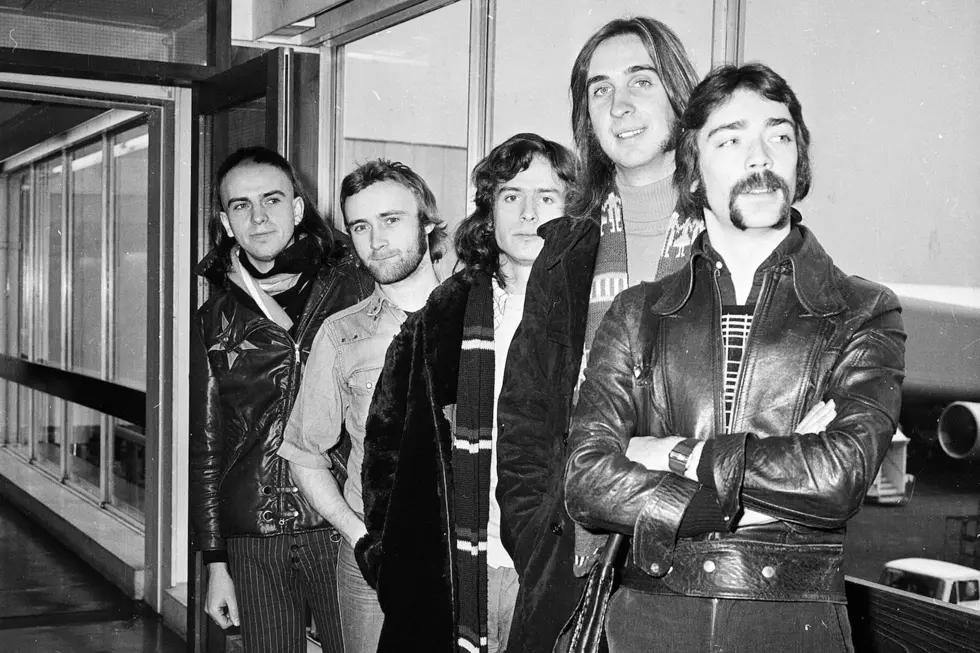
How ‘Duke’ Pointed to Genesis’ ’80s Domination
Genesis weathered a number of ups and downs during the '70s, scaling ever-greater heights of commercial success even as a series of lineup changes thinned the band's ranks to a trio.
As the decade drew to a close, they'd never been more popular — but they weren't sure how, or if, they'd continue.
Remaining Genesis members Tony Banks, Phil Collins, and Mike Rutherford reached a crossroads at the end of their long tour in support of 1978's ... And Then There Were Three ... , with Collins in particular needing time off to try and repair his ailing marriage. With their drummer an ocean away in Vancouver, Banks and Rutherford decided to stay productive during the downtime, embarking separately on their first full-length solo efforts.
"Basically, I got divorced. Or rather, I'm getting divorced and it's been dragging on," Collins explained to Sounds in 1979. "That's why Mike and I did our solo albums," added Banks. "We decided it was better for us to worry about our own albums than worry about anything else."
When Collins returned to the U.K. months later, both of his bandmates were otherwise occupied — Banks with A Curious Feeling, which arrived in stores in October 1979, and Rutherford with Smallcreep's Day, which followed in early 1980 — so he busied himself writing the material that would eventually make up his own solo debut, 1981's Face Value.
For Collins, who'd always taken more of a back seat in the songwriting department for Genesis, even after taking over lead vocals in the aftermath of Peter Gabriel's departure, it proved a pivotal moment.
Listen to Genesis Perform 'Misunderstanding'
Over the long run, Collins' emergence as a writer and vocalist would lead to his incredible reign — both with Genesis and as a solo artist — as one of the defining voices of the '80s. But those glories were still on the horizon when the band reconvened for what would become its 10th studio LP. At the time, what the members of the trio chiefly noted was how satisfying it could be to make an album with only three equal voices competing for attention.
"It was much harder with five of us," suggested Rutherford during an interview with the Daily Express. "There were so many ideas floating around. We were also a lot younger, and everything clashed. Then, as we got older, we mellowed. There is so much more room for the three remaining members that we don't feel trapped — and things that used to be important aren't quite so vital."
"We seem to be interacting as a group much better," added Collins. "And there's definitely a side to us coming out which wasn't on the last album; the playing side."
Those words may have come as a relief to fans who missed the band's experimental side in the relatively compact songs that made up ... And Then There Were Three ..., but the new LP — titled Duke and released in the U.S. on March 31, 1980 — wasn't exactly a full-fledged return to expansive song structures and instrumental flights of fancy.
Instead, it rather artfully bridged the middle ground between the band's progressive past and mainstream future, peppering shorter, radio-friendly pieces in between the longer numbers.
Listen to Genesis Perform 'Turn It On Again'
"I'd still say this album was dominated more by what Mike and I wrote, but Phil was coming up much more to be a kind of equal," Banks reflected later. Suggesting that the band members "were a little barren of ideas" when they came together again, he said, "we sat down and did a lot more improvising" — a process that produced songs like "Behind the Lines" out of orphan chord progressions.
At one point in the interview, Banks joked that "not every song can be 25 minutes long" — an attitude that had a tremendous impact on Duke, which at one point was supposed to include a half-hour track that opened a window into the bittersweet journey of a character named Albert. Ultimately, for reasons of balance as well as a desire to avoid comparisons with earlier works such as "Supper's Ready," that song was broken up into pieces that would eventually become familiar to fans as "Behind the Lines," "Duchess," "Guide Vocal," "Turn It On Again," "Duke's Travels" and "Duke's End."
Between those collaborative efforts, Duke delivered a pair of solo compositions from each member of Genesis, resulting in a record that offered Banks, Collins and Rutherford plenty of room to shine as individuals while highlighting the strengths of the band as a unit — and, in hindsight, serving as Collins' coming-out party for the incredible decade to come.
"It's the first album we've done that I've had the time and inclination to put myself into completely," Collins told Sounds in 1980. "I was always the last to leave the studio and I put a lot of myself into it. ... My commitment to Genesis is greater than it ever was before. I would fight for it more now than I would have done before because it's more me. That's what it comes down to — there's more of me in it."
Listen to Genesis Perform 'Behind the Lines'
The increased Collins quotient certainly didn't hurt Duke on the charts, where it soared to No. 1 in the U.K. and No. 11 in the States, best-ever showings for the band on either side of the Atlantic. The record also produced Genesis' biggest American hit to that point in "Misunderstanding," an effortlessly hooky mid-tempo number that Collins later admitted had been written as a sort of tribute to an immediately identifiable rock drumbeat.
"I had written [it] kind of based on a rhythm a little between 'Hold the Line' by Toto and 'Sail On, Sailor' by the Beach Boys," Collins recalled later. "'Rocky Mountain Way' by Joe Walsh — that kind of rock when it's just in the right place. I was going to have it on Face Value, but Tony and Mike really liked it for the same reasons — they liked that Beach Boys kind of rock thing."
"Misunderstanding" was a bit of an outlier in the context of Duke, which included the nearly nine-minute "Duke's Travels" as well as the tricky shifting time signatures of "Turn It On Again," but it was merely the first in a series of increasingly Top 40-friendly singles issued during an era in which the balance between prog and pop wasn't always struck as artfully as the band members managed it here. In hindsight, it represents arguably the best of what this version of Genesis had to offer.
"This album — I have to be honest, this is my favorite Genesis album," Banks concurred during a documentary interview years later. "It has such a sort of positive quality about it."
"If Duke hadn't happened, we wouldn't have carried on, I think," said Rutherford, echoing the record's importance. "We sort of ... re-found ourselves a little bit."
Phil Collins and Peter Gabriel Albums Ranked
Steve Hackett Released One of Rock’s Most Hated Albums
More From Ultimate Classic Rock









